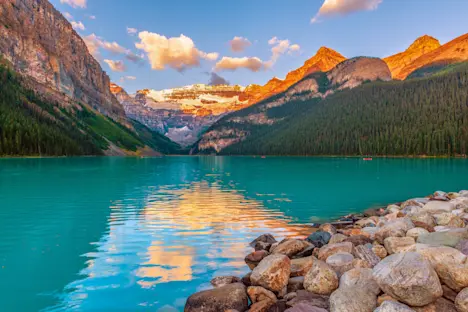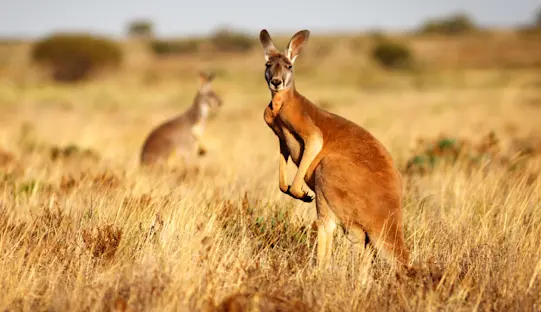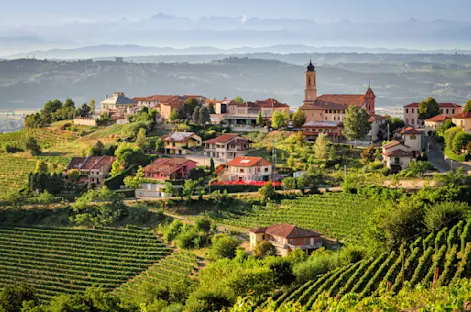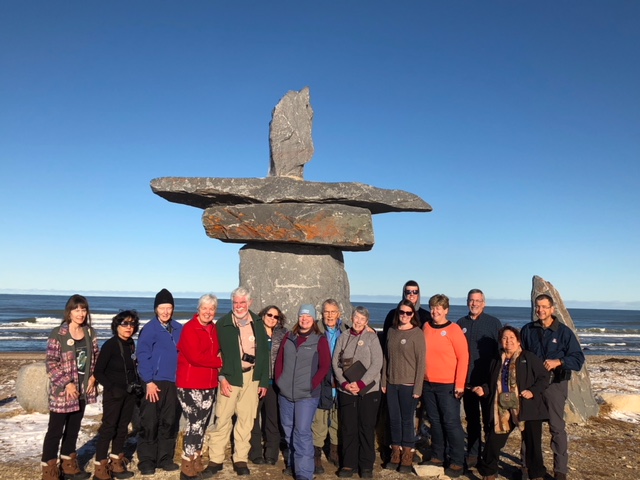For hundreds of years, polar bears have been migrating though Churchill to make their way across the frozen Hudson Bay. I was excited to be in the “polar bear capital of the world” to see these awesome creatures but as I exited the plane I was immediately concerned by the mild temperatures. It was about 37-40 degrees Fahrenheit, the air was calm, and the sun was warm. I only needed a light jacket and hat to go from the plane to the bus. I wondered what this might mean for the polar bears gathering on the tundra in the weeks ahead. Would the bay freeze over and allow the polar bears to continue their annual migration and break their months-long fast?

The tour group warmly posing in front of an Inukshuk. Churchill, Manitoba. October 24, 2017. ©Kelly Brasseau/WWF-US
Over the next few days on the tundra, our tour guide, Sheri Sarri, surprises and excites us with her keen spotting skills, vast knowledge of the wildlife, and her genuine enthusiasm and appreciation of her work and the people in Churchill. Our expert tundra buggy driver, Val Kelly, maneuvers over large craters to give us the best views of mothers and their cubs. This inspires Sheri to break out into a song she wrote about polar bear reproduction! We learned that after the female becomes pregnant, the male wanders off and she alone raises and protects her cubs until they are two years old.

Female polar bear roaming the tundra waiting for the freeze. Churchill, Manitoba. October 26, 2017. ©Kelly Brasseau/WWF-US

Female polar bear curious about our tundra buggy. Churchill, Manitoba. October 26 2017. ©Kelly Brasseau/WWF-US

Day three on the tundra and the temperature finally drops and the ground freezes. Winter is coming! Churchill, Manitoba. October 26, 2017. ©Kelly Brasseau/WWF-US
The town of Churchill has had its share of hardships this year. This spring, a flood wiped out the railroad tracks, the main mode of transportation of supplies, food, and fuel, leaving a struggling town in its wake. NatHab and Calm Air opened space on their charter flights for residents and extra supplies. Everyone has been pitching in to help the town prepare for the winter months. This summer, artists participating in a mural project, organized by the Pangea Seed Foundation’s Sea Walls project, were not derailed by the flood. They had to fly instead of travel by train, so they were not able to bring all of their supplies, but the town of Churchill opened their doors and took care of the artists’ needs as they created 18 stunning murals that promote ocean conservation in Churchill and worldwide.
We met some wonderful characters in Churchill whom have faced difficult challenges. Caroline, a Dene woman, told her story of being taken from her family at an early age, told not to speak her language and forced to assimilate to Western culture. Like many, she turned to alcohol for solace. After years of alcohol abuse and burying her identity, she began to make the journey of self-discovery by finding that lost little girl and reconnecting with the Dene culture. Now she is in recovery and does her part to educate others about her culture.
Another local we met was Kelly, owner of a dog sledding team. He has been facing the challenging task of feeding his dogs since the railroad has been shut down due to the flooding. Dog food is expensive to import to this area, typically $60 for a bag, however since the flood has caused most supplies to be flown in, it now costs around $130 a bag! Kelly feeds his dogs off the land as much as possible. Though, even these efforts have been hurt as his typical fishing spots were washed out by the flooding. Fortunately, he was able to contact a friend to get a shipment of dog food in for the winter, but he still must travel over 120 miles via water to pick it up.
Both Caroline and Kelly continue to face their challenges head on as they come, doing their best to survive and remain resilient.

View from the dog cart. There wasn’t enough snow on the ground to sit on the sled. Churchill, Manitoba. October 27, 2017. ©Kelly Brasseau/WWF-US
Coming to Churchill to see the polar bears was amazing and the people I met along the way really changed my life. Especially the people on the tour adventure. A group of strangers from diverse backgrounds became friends as we bonded over the beautiful landscape; were captivated by the wildlife in their natural habitat, and sympathized over the plight of the locals.
By Kelly Brasseau, WWF


































